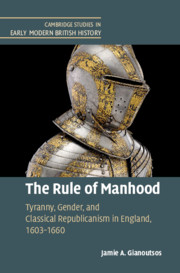Book contents
- The Rule of Manhood
- Cambridge Studies in Early Modern British History
- The Rule of Manhood
- Copyright page
- Dedication
- Contents
- Figures
- Acknowledgements
- Introduction
- Part I Emasculated Kingship
- Chapter 1 Tyranny, Manhood, and the Study of History
- Chapter 2 A Chaste Virginia
- Chapter 3 ‘And thus did the wicked sonne murther his wicked mother’
- Chapter 4 Neronian Corruption in Caroline England
- Part II The Masculine Republic
- Conclusion
- Bibliography
- Index
Chapter 1 - Tyranny, Manhood, and the Study of History
from Part I - Emasculated Kingship
Published online by Cambridge University Press: 26 January 2021
- The Rule of Manhood
- Cambridge Studies in Early Modern British History
- The Rule of Manhood
- Copyright page
- Dedication
- Contents
- Figures
- Acknowledgements
- Introduction
- Part I Emasculated Kingship
- Chapter 1 Tyranny, Manhood, and the Study of History
- Chapter 2 A Chaste Virginia
- Chapter 3 ‘And thus did the wicked sonne murther his wicked mother’
- Chapter 4 Neronian Corruption in Caroline England
- Part II The Masculine Republic
- Conclusion
- Bibliography
- Index
Summary
In his magnificent entrance to London on the Ides of March 1603/4, King James was hailed and celebrated as a new Caesar Augustus, ushering in ‘those golden times … returned againe’, as Ben Jonson described through the words of Vergil, ‘wherein Peace was with vs so aduannced, Rest receaued, Libertie restored, Safetie assured, and all Blessednesse appearing in euery of these vertues her perticular Triumphe ouer her opposite euill’.2 Amongst the classical arches and scenes erected for the King’s entertainment and celebration, processors dramatically enacted the Vergilian prophecy of a peaceful empire by closing the gate of a reconstructed Temple of Janus upon which the words were inscribed: ‘James the greatest emperor, Caesar Augustus the Father of his Country, as peace has been brought forth for the British people on land and sea, a decree of the Senate has closed the gate’. By resurrecting ‘these dead rites’ on English soil, Jonson fashioned James’s great procession as a triumphal entry of peace rather than of war and his new king as possessing ‘strong and potent vertues’ beyond those of Mars.
- Type
- Chapter
- Information
- The Rule of ManhoodTyranny, Gender, and Classical Republicanism in England, 1603–1660, pp. 21 - 65Publisher: Cambridge University PressPrint publication year: 2020

